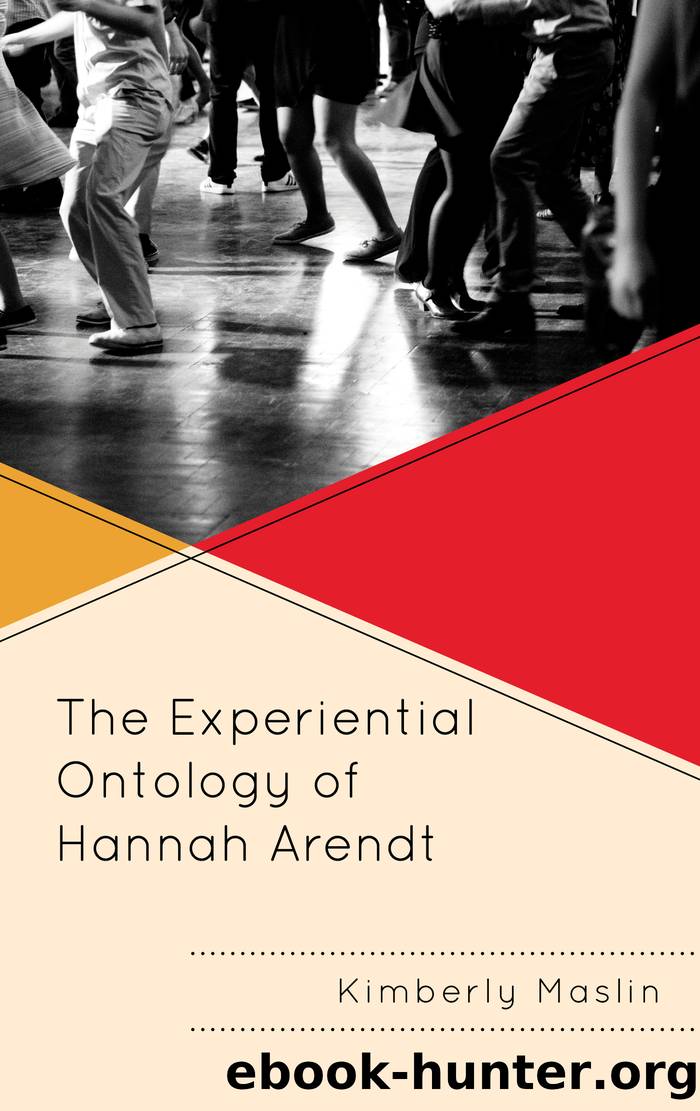The Experiential Ontology of Hannah Arendt by Kimberly Maslin

Author:Kimberly Maslin
Language: eng
Format: epub
Tags: undefined
Publisher: undefined
Published: 2012-07-15T00:00:00+00:00
Conclusion
With Totalitarianism, Arendt continues to reveal the ontic features that press, this time in an immediate sense, upon both victims and perpetrators of the atrocities in Germany and Russia. As with Anti-Semitism and Imperialism she illustrates the emergence of a totalitarian personality. Only in the subsequently added “Ideology and Terror” does she explicitly connect ontic conditions with the ontological orientation. As such Origins constitutes a work of historicity in which Arendt approaches the ontological through the ontic. In other words, since ontological questions can only be taken up once one has undertaken an unconcealment of some concrete aspect of one’s existence, Arendt devotes most of Origins to creating a familiarity with historical developments before taking up the ontological questions. Though the prevailing scholarly term for Arendt’s interest may have been totalitarianism, as Dana Villa points out she is interested in understanding a system that required “an unending supply of innocent victims” for both its logic and its perpetuation.[91] In other words, she examines a system in which “genocide was the raison d’etre.”[92] Ultimately it may well be in the area of comparative genocide studies that Totalitarianism finds its most enduring impact.
Arendt engages in a bit of a debate with Eric Voegelin regarding one of his critiques of Totalitarianism. Voegelin disputes Arendt’s claim that totalitarianism dehumanizes since the essence of humanity cannot change.[93] As chapter outlines, letters and some early essays demonstrate, Arendt is clearly in the process of “thinking something through” with Totalitarianism in particular.[94] She is working through the relationship between the ontic and the ontological. She more or less accepts Heidegger’s proposition that the mode of care is a constitutive feature of Dasein. Contra Heidegger she cannot dismiss or even marginalize the ontic. In Anti-Semitism and Imperialism, she notes that ontic phenomena can fundamentally affect one’s manner of being in the world. The crucial task for Arendt is to understand how. In light of the primacy of this task, the question of whether human nature can change or human nature is necessarily unchangeable, Voegelin’s question, resembles a matter of semantics, though she is clearly interested in whether something fundamental is altered under conditions of modernity. In keeping with the Heideggerian importance of projection, she views spontaneity and creativity as constitutive features of the nature of being and she has argued that ontic conditions can create an “innate” Jewish or imperialist personality. The question with respect to totalitarianism, thus, becomes does totalitarianism alter something more profound than personality, something intrinsic or perhaps even eliminate spontaneity itself? Would “normal people” under conditions of modernity, eschew spontaneity for security? Or does personality, perhaps particularly when it comes to characterize a group, serve as an indicator of something more profound or intrinsic, such as one’s manner of being in the world?
She concludes “Totalitarianism in Power” with the query—have conditions of modernity created such dire living conditions that normal people would rationally opt for security and certainty at the cost of spontaneity and creativity? And can the techniques of total domination eliminate human
Download
This site does not store any files on its server. We only index and link to content provided by other sites. Please contact the content providers to delete copyright contents if any and email us, we'll remove relevant links or contents immediately.
The remains of the day by Kazuo Ishiguro(7551)
Tools of Titans by Timothy Ferriss(6950)
The Black Swan by Nassim Nicholas Taleb(6192)
Inner Engineering: A Yogi's Guide to Joy by Sadhguru(5897)
Giovanni's Room by James Baldwin(5879)
The Way of Zen by Alan W. Watts(5800)
The Six Wives Of Henry VIII (WOMEN IN HISTORY) by Fraser Antonia(4791)
The Power of Now: A Guide to Spiritual Enlightenment by Eckhart Tolle(4756)
Astrophysics for People in a Hurry by Neil DeGrasse Tyson(4620)
Asking the Right Questions: A Guide to Critical Thinking by M. Neil Browne & Stuart M. Keeley(4576)
12 Rules for Life by Jordan B. Peterson(3734)
The Ethical Slut by Janet W. Hardy(3504)
Skin in the Game by Nassim Nicholas Taleb(3462)
Housekeeping by Marilynne Robinson(3402)
The Art of Happiness by The Dalai Lama(3385)
Double Down (Diary of a Wimpy Kid Book 11) by Jeff Kinney(3274)
Skin in the Game: Hidden Asymmetries in Daily Life by Nassim Nicholas Taleb(3264)
Walking by Henry David Thoreau(3234)
12 Rules for Life: An Antidote to Chaos by Jordan B. Peterson(3204)
